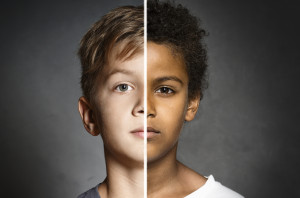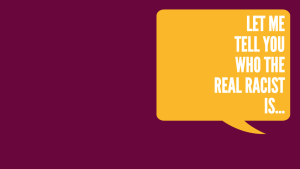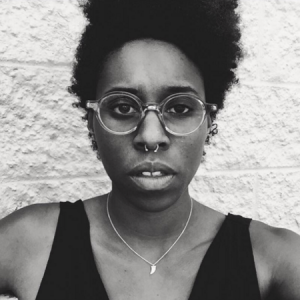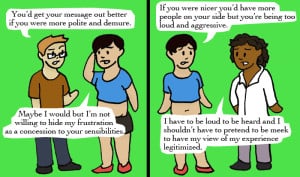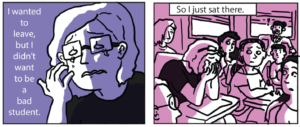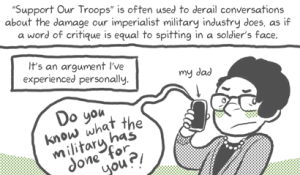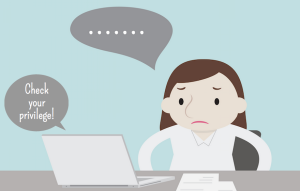This video is part of a series for everyday feminism, a website dedicated to helping you stand up to and break down everyday oppression. In 2012, a young Black boy by the name of Trayvon Martin was shot and killed by George Zimmerman on the way home from the corner store. Zimmerman was part of a neighborhood watch group for a gated community in Stanford, Florida where Trayvon was temporarily staying. Murder charges were rendered against Zimmerman, but ultimately he was acquitted of all charges and never went to trial. Trevyon’s death sparked a conversation about anti-Blackness in America and the hashtag #blacklivesmatter was created by Patrice Colors, Opal Temetti and Alycia Garza.
Most recently it’s being used to bring attention to the death of Freddie Gray, a Black man who was killed while in the custody of the Baltimore Police Department. His death ignited the Baltimore Uprising where the hashtag #blacklivesmatter is currently being utilized. In response to #blacklivesmatter, the hashtag #alllivesmatter was created. The idea behind this hashtag was that blacklivesmatter excluded everyone who wasn’t Black from the conversation. A popular defense of #alllivesmatter is that we shouldn’t be focusing exclusively on Black lives as Black lives hold as much value as everyone else’s. Instead of saying Black lives matter, we should say all lives matter, as all lives hold value.
To be honest with you, I absolutely agree. All lives do matter. However, the creation of Black lives matter’s comes from the fact that within larger conversations about things like police brutality, the specific struggles of Black people are often ignored. See, most people use the hashtag #alllivesmatter strongly believe that we live in a post racial society and it’s easy to think that way when you’re not the target of systematic racism. Systematic racism that’s stated that by law, Black bodies were the property of their White slave masters. It said that the body parts of Black slaves could be extracted and sold at the whim of their White slave masters.
It said that the children of slaves were born into this world as the property of their White slave masters. Slavery ended on paper only a hundred and fifty two years ago in 1863, but the after effects of slavery still continue. Segregation is a lingering result of the emancipation of slaves, and it ended only fifty two years ago back in 1964. Segregation said that if you were a Black person in this country, that you didn’t deserve to drink from the same water fountain as a White person, it once stated that one single Black man was equal to three fifths of a full White man. It said that Black children weren’t allowed to get the same quality of education as White children.
Just because something was eradicated by law doesn’t mean that it no longer exists. In fact, segregation still exists in numerous ways. Yes, it’s 2015, but the impact of segregation in Baltimore is still felt in the racial divide that’s largely informed by red lining. Red lining was when banks refused to give housing loans to African Americans, instead they loaned to White communities and the prosperity of White communities spread while Black and Brown communities remained impoverished. This made it so that home ownership in Baltimore was more attainable for White people and it kept Black and Brown people from owning homes and this is one of the thousands of examples where red lining kept people of color from pursuing the same degree of prosperity as their White counterparts.
Much in the way that homophobia still exists in the states where gay marriage is legalized, anti-Blackness still exists and it subconsciously says many things. Today, it says that a hooded sweatshirt is probable cause for murder. It says that the accusation of theft is enough to kill an unarmed Black teen. It says that playing with an air soft gun is just something that you can’t do when you’re a Black child. All lives absolutely do matter, but Black lives mattering is still a relatively new concept. Remember, America is only two hundred and thirty nine years old. Anti Blackness is prevalent in the usage of #alllivesmatter.
You’ll notice that all #alllivesmatter is only something that’s mentioned when someone says that Black lives matter. If you actually believe that all lives mattered, saying Black lives matter wouldn’t make you feel uncomfortable. When minority groups make space for themselves, majority groups often respond with accusations of erasure and selfishness. In reality, if the needs of said minority were being met by the majority group, there’d be no need for the minority group to feel like they needed to make space for themselves and making space for other people doesn’t make less space for you. Saying #alllivesmatter is like me going to your Grandmother’s funeral and demanding that you feel sorrow for the death of my cat.
An important thing that should be understood about these conversations as they exist on social media, is that usually it’s about mourning the loss of Black lives. When you’re in mourning, it’s not helpful or progressive to be told that your feelings of fear, and sorrow are irrelevant and that you should care about everybody’s feelings instead of acknowledging your own loss. #blacklivesmatter is a reminder that Black lives matter. It’s not a statement that the only lives that matter are Black. #alllivesmatter is a fanciful thing that you can say when you don’t actually want to put the work into fighting against inequality.
If you truly believe in equality, you’ll recognize the ways in which we are unequal and fight with us to make it so that the needs of specific groups are being met. We are each born into a world that has history and you can’t pretend that the past fifty years is going to undo the centuries of anti-Black racism worldwide. If you truly believe that all lives matter, you’re not going to try to silence a Black person whose speaking out about how their dehumanized in a society that only very recently has decided that they are worthy of autonomy and changing #blacklivesmatter to #alllivesmatter communicates to me that you just don’t know that.
Stand up for the lives of Black people. Stand up for the lives of differently abled people. Stand up for the lives of neuro atypical people. Stand up for the lives of Brown people. Ultimately, stand up for the lives of all people. Recognize that while, yes, we may all certainly be human, that we are each handled differently and have unique experiences because of how society has been structured to favor certain types of people. Stop playing semantics and engage in this conversation or simply don’t have it. I will never be able to walk away from a conversation about racism because racism is something that I experience every single day of my life, whether I like it or not. All I’m saying is stop talking and start walking.
Instead of telling me that all lives matter, tell the racist among you that Black lives matter too. Kat Black for everyday feminism signing out. If you liked this video, support me on patreon to get access to exclusive vlogs. Hey guys, it’s Kat. First of all, as you guys can tell, I have a new camera. It’s very, very strange for me because I’m not used to …







